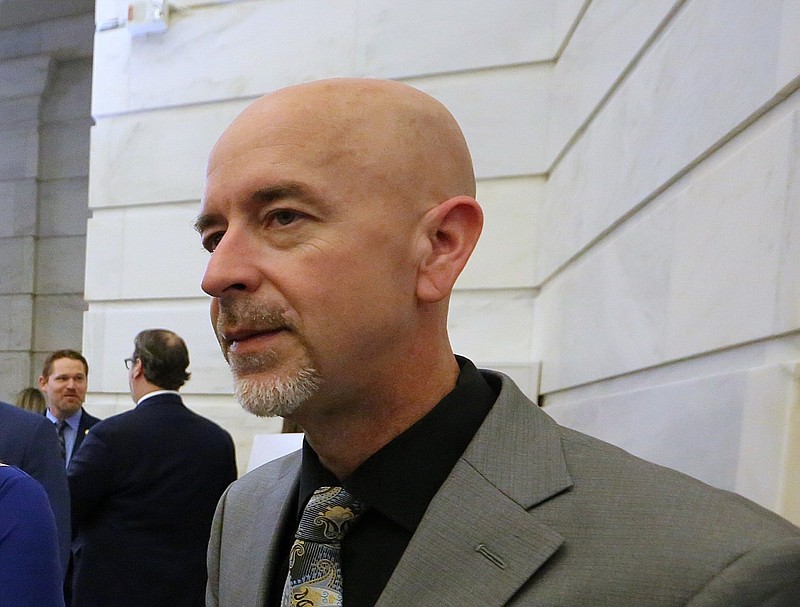Arkansas Education Secretary Jacob Oliva offered assurances Wednesday night that accountability and guardrails will be incorporated into the rules for the new Arkansas LEARNS Act and its provision to expand the use of public funding for private school tuition and home school expenses.
Oliva said that “bad actors” won’t be allowed to purchase electronic game systems or start a school “in a shed” with the state funding, which will be available to some families for private and home school choices as soon as the coming 2023-24 school year.
Rules and regulations for the Children’s Educational Freedom Account program — the funding for private and home school students — are not yet developed but will be specific and robust while also giving families flexibility in their decisions for the education of their children, he said.
“There will not be direct payments to these families,” he said. “There will be accountability provisions for students participating in the programs. And what constitutes an educational-related expense will be solidified through rules.
“[The money] will support curriculum, books and necessary school supplies. It’s not going to let somebody buy a PlayStation and say that is of educational value,” Oliva said. The law is very specific on how dollars can be utilized. We are going to hold people accountable. If we find people are misusing funds, we’re going to go after them to the full extent that we can. We’re not going to let bad actors ruin a great program.”
Responding to questions for about 40 minutes on an online forum hosted by The Reform Alliance, Oliva said more than 1,000 people have applied so far to be members of six different work groups that will draft proposed rules and regulations for the recently passed 145-page law. The application period for work group members closes Friday.
The LEARNS Act is Gov. Sarah Huckabee Sanders’ effort to restructure education from kindergarten through 12th grade. LEARNS stands for literacy, empowerment, accountability, readiness, networking and safety.
Oliva said that the work groups won’t include all who apply but that an effort will be made to keep those not selected informed about the work and use them for feedback as the rules are developed for carrying out the law.
Emmy Henley — managing director of The Reform Alliance, a nonprofit organization that operates an already existing but much smaller state-funded private tuition program — posed questions to Oliva on how and when families might apply for the state funding and how the money could be used by families to home school their children.
Some of the questions included: Will applications be online and will single-parent families qualify? Can students transfer between private schools during a school year? Can the state-funding in a student’s account be accumulated and used for college costs? Will the state require families to choose from a list of approved curricula or can families submit preferences? How will applications be evaluated?
“When we build out these systems and we empower parents and give school districts the support they need, we know we are going to see learning improve, and when learning improves, we are going to see the state thrive,” Oliva said.
“While we may not have all the answers for everybody today, we’ll get there. We’ll get these programs up and running. There may have some hiccoughs along the way so I want to ask for people’s patience. At the end of the day it’s about students and not systems.”
The Educational Freedom Account Program for Arkansas students would be phased in over three years, starting in the upcoming 2023-2024 school year for no more than 1.5% of the state’s public school enrollment.
Each student’s account would be equal to 90% of the state foundation aid provided for public school students in the prior school year. This year’s foundation aid is $7,413 per student.
In this upcoming first year, the students eligible for the funding for private school tuition and supplies include those who are first-time kindergartners, students with disabilities, homeless and foster students, the children of active military service people and students who are assigned to state-graded “F” public schools or a district that is classified as "Level 5 - intensive support."
The pool of eligible students for Educational Freedom Accounts would expand to include up to 3% of the public school enrollment in 2024-25. Eligibility would be expanded to include students in D and F-graded schools as well as children of military veterans, law enforcement officers or first responders.
By 2025-2026, all students eligible to attend Arkansas public schools could access the taxpayer-funded accounts for use in offsetting private school tuition and other education-related costs.
Private schools that accept Educational Freedom Account students must be accredited by the state Board of Education or the Arkansas Nonpublic School Accreditation Inc, or be an associate member and an applicant for accreditation by that organization.
The private school must employ teachers who hold at least a bachelor’s degree or have equivalent documented experience, and have gone through a background check.
Participating private schools must administer a state Board of Education-approved test to the Educational Freedom Account students. The aggregate results of the testing of private school students must be made public.
